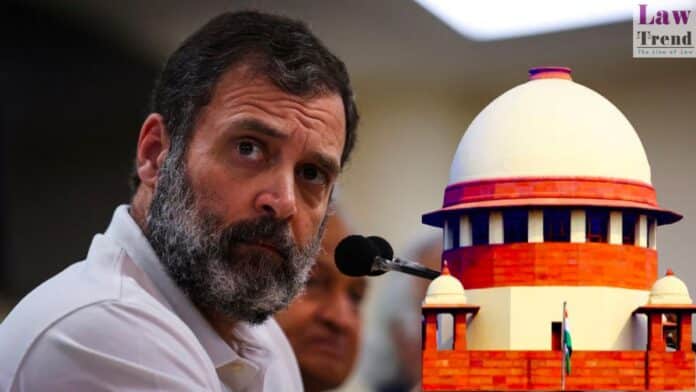The Supreme Court on Monday stayed defamation proceedings initiated against Congress leader and Leader of Opposition in Lok Sabha, Rahul Gandhi, over his controversial remarks about the Indian Army being “thrashed” by Chinese forces in Arunachal Pradesh. The remarks were allegedly made during his Bharat Jodo Yatra on December 16, 2022.
A bench comprising Justices Dipankar Datta and A.G. Masih passed the interim order while hearing Gandhi’s Special Leave Petition (SLP) challenging the May 29 decision of the Allahabad High Court, which had refused to quash the defamation complaint and the summoning order issued against him.
Background
The defamation complaint was filed by former Director of the Border Roads Organisation (BRO), Uday Shankar Srivastava, before a local court in Uttar Pradesh. The complaint alleged that Gandhi’s statements were derogatory and defamatory towards the Indian Army.
Gandhi, in his plea before the Supreme Court, contended that the complaint was motivated and driven by malice. Appearing for him, senior advocate Dr Abhishek Manu Singhvi argued that opposition leaders must have the space to raise questions and express concerns in a democracy.
Key Observations by the Supreme Court
During the hearing, the bench made several pointed remarks and posed tough questions to the petitioner’s counsel:
- On Forum for Political Speech: Justice Dipankar Datta questioned the choice of medium used by Gandhi, asking, “Whatever you have to say, why don’t you say it in the Parliament? Why do you have to say this in the social media posts?”
- On Factual Basis of Allegations: Justice Datta asked, “How do you get to know that 2,000 square kilometres of Indian territory were occupied by the Chinese? Were you there? Do you have any credible material? Why do you make these statements without any… If you were a true Indian, you would not say all this.”
- Response from the Defence: Singhvi replied, “It is also possible that a true Indian will say that our 20 Indian soldiers were beaten up and killed and that it is a matter of concern.”
- On Context of Conflict: The court further asked, “When there is a conflict across the border, is it unusual to have casualties on both sides?”
- Legal Point on Section 223 CrPC: The bench noted that the provisions under Section 223 CrPC were not raised before the High Court, which could have bearing on the maintainability of joint trial in such defamation cases.
Granting Gandhi a reprieve, the Supreme Court issued a stay on the criminal proceedings for a period of three weeks and agreed to hear the matter in detail. The case is now slated for further consideration by the bench.




